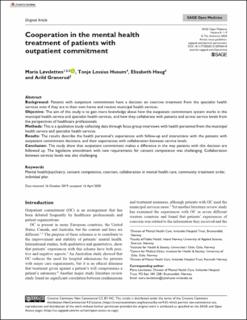Cooperation in mental health treatment of patient with outpatient commitment
Peer reviewed, Journal article
Published version

Permanent lenke
https://hdl.handle.net/11250/2729798Utgivelsesdato
2020Metadata
Vis full innførselSamlinger
Sammendrag
Background: Patients with outpatient commitment have a decision on coercive treatment from the specialist health services even if they are in their own home and receive municipal health services. Objective: The aim of this study is to gain more knowledge about how the outpatient commitment system works in the municipal health service and specialist health services, and how they collaborate with patients and across service levels from the perspectives of healthcare professionals. Methods: This is a qualitative study collecting data through focus group interviews with health personnel from the municipal health service and specialist health services. Results: The results describe the health personnel’s experiences with follow-up and interactions with the patients with outpatient commitment decisions, and their experiences with collaboration between service levels. Conclusion: The study show that outpatient commitment makes a difference in the way patients with this decision are followed up. The legislative amendment with new requirements for consent competence was challenging. Collaboration between services levels was also challenging.
